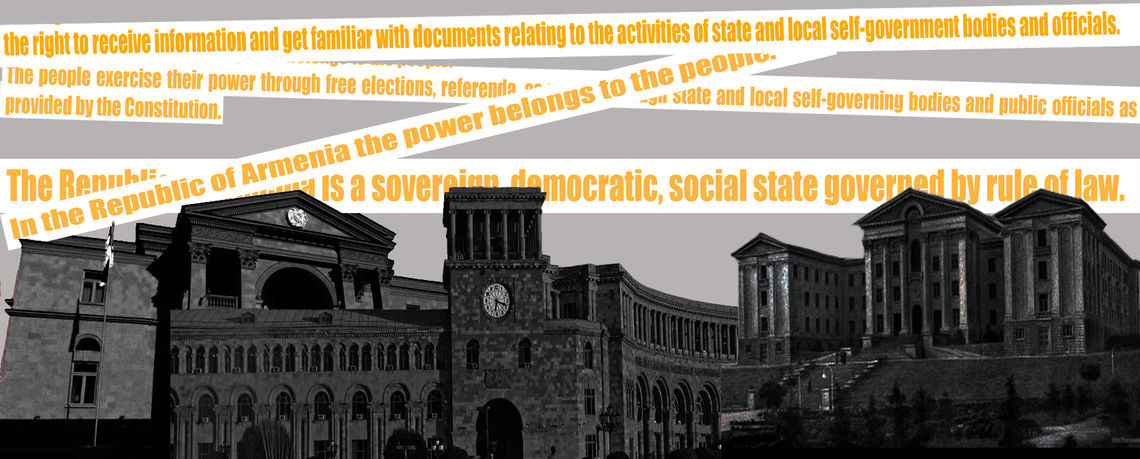Tue Apr 10 2018 · 5 min read
From National Security to the Concentration of Power

By Lusine Sargsyan

Following the 2015 Constitutional Referendum in Armenia, which entered into full force after the term of President Serzh Sargsyan expired on April 9, 2018, the prime minister will become the head of state with full executive power, while the role of the newly elected president will be largely ceremonial and non-partisan. Under the package of Constitutional reforms, Armenia joins countries like Israel, Finland, and Moldova all of which have a parliamentary system of governance. The advocates of parliamentarism argue that the changes will democratize the Armenian political landscape, but critics are equally vocal and claim that the changes are predominantly targeted to empower the position of the future prime minister and diminish the remaining channels of opposition.
It is in this context that the implications of the newly adopted law on the Formation and Activity of the Security Council become critical, the name of which was changed from the National Security Council to Security Council. It is important to mention that the Council operated in accordance with Article 55.6 of the 2005 Constitution, which states that the president of the RA forms and presides over the Council. Under the 2015 Constitution, however, Articles 152.1 and 155.2 regulate the activities of the Council and mention that the prime minister will preside over the body and Security Council will determine the main directions of the defense policy respectively.
According to Davit Harutyunyan, Armenia’s Justice Minister, the Security Council will be directly subordinated to the prime minister to ensure the agency’s increasing political responsibility. The primary objective, he continues, is to guarantee that each governmental body, including the Security Council, is accountable to a specific individual. Under Robert Kocharyan’s and Serzh Sargsyan’s administrations, the Council played a nominal role and was rather marginalized from the formulation and implementation of national security policies. However, under the new Constitutional reforms, it seems that the body will regain the influence it had from 1992-93/94 during Levon Ter-Petrosyan’s administration, the primary reason for which was the ongoing Karabakh War.
Critics of parliamentarism usually stress that this system of governance lacks the inherent separation of powers. Since much authority is centralized in the executive branch, the judiciary and legislative bodies have limited opportunities to administer checks and balances on the executive. The sheer dominance of the executive branch in the newly formulated Security Council is vividly illustrated in the case of Armenia and contributes to further complications.
The 10 members of the current Security Council are:
the Prime Minister
the First Deputy Prime Minister
the Two Deputy PMs
the Secretary of the Security Council
the Defense Minister
the Foreign Minister
the Director of the National Security Service
the Police Chief
the Chief of General Staff of the Armed Forces
It is evident from the list that the President, the Speaker of the Parliament, the President of the Constitutional Court, and the Prosecutor General, who previously were part of the Security Council will be excluded from the decision making process. It is also obvious that the number of the members is not odd which can potentially create problems during voting procedures. Power will be consolidated in the hands of the prime minister, thus the authority to make decisions will be concentrated in the hands of the executive body. The absence of the legislative branch, however, could be explained by the fact that the Security Council will be making decisions concerning defense policy only. The issue that requires attention is that representatives of the executive branch will often be challenged to guarantee that the voice of all the affected stakeholders is heard and inclusive policies are developed.
Article 4.3 of the law states that other agency representatives can participate in the meetings, however, only with the invitation from the prime minister. But further explanation concerning the circumstances under which additional participants will be requested to participate or the scope of their involvement is left to the reader’s interpretation. Whether the invited officials can be present during the voting procedure is also vague and inadequately explicated. Since a broad representation of viewpoints and interests will be absent in the Council, there is the danger that the Council will not fully understand or grasp the nature of domestic or external threats. The major concern here is whether the Council will assure that the appropriate officials from the appropriate agencies are present during the discussions.
The structure of the Security Council, as prescribed by the recently adopted law, will be transformed from an advisory body to a decision-making one on defense policy issues. After the 2005 Constitution was adopted, the activities of what was then called the National Security Council as an advisory body included identifying domestic and external challenges, assessing and developing effective mechanisms to tackle those threats. Now, by the proposal of the prime minister, who is going to chair the Security Council, the body can discuss issues pertaining to the country’s security, territorial integrity, and immunity of the borders. Thus, it is evident that if previously securitization was only part of the military rhetoric, now it is already prescribed by the law.
The frequency of the meetings, which has been decreased to once every three months, is another change in the law and requires further discussion. The lack of confidence concerning the efficiency of those meetings stems from the fact that even under previous administrations when the frequency was once every two months, the national security council process was usually characterized as distorted. The potential danger is that the dysfunctional nature of the Security Council will remain unsolved despite its current decision making role.
Article 5 of the law, which primarily focuses on the rules of the voting procedure states that the decisions concerning the directions of the defense policy can be made only if seven members of the Council vote in favor of the resolution. The decisions of advisory nature, however, can be passed by a simple majority of votes. The article further elaborates that only the prime minister is authorized to sign the decisions. It is apparent that the voting procedure is yet another mechanism which is aimed at elevating the role of the prime minister and creating fertile ground for decisions passed unanimously.
A closer observation of the backgrounds of the Security Council members reveals that the body will potentially be dominated by the Republican party, which makes party politics another shortcoming of the law. It is reasonable to question the impartiality and autonomy of the Council where the diversity of opinions will be lacking, and where the entrenched elite will be tempted to represent the interests of the party.
The Council will soon start its activities and adopt critical decisions which will impact each citizen of the country. It remains to be seen if the new Security Council will be able to rise above party politics to prioritize and address the true challenges of Armenia’s national security.


